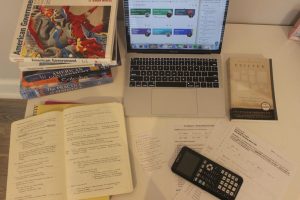Quarter four grade weight reduction may demotivate frustrated students

(Photo by Maya Hruskar ’23)
Another hour spent in front of a computer screen. Lessons that feel like busy work. And above it all, a growing dissatisfaction for school. This quarantine has presented new and unique challenges to everyone, and the relationship between students and their schoolwork is no exception.
Without the face-to-face interaction that school usually provides, schoolwork has begun to feel more like busy work for many students. Because of this, a reduction in grade weight may be the tipping point for dissatisfied and increasingly frustrated students to abandon their work ethic and lose the little value left in virtual learning.
Recently, the math department made the decision to have quarter four count for only 12.5% of the year’s grades, equivalent to the midterm, while quarters one through three count for 25%. This is in contrast to the English, social studies, science and other departments’ decisions, all of whom chose to keep quarter four equivalent to the first three quarters of this year.
According to Sarah White, a Staples math teacher, this decision was made over a virtual meeting that the math department held to discuss how final grades should be most accurately represented.
The decision the math department has made is certainly one that I agree with and that I believe other departments should have pursued. Having said that, I have concern over the unintended ramifications this may have on students.
Due to factors including, but not limited to, a lack of human interaction when completing assignments, the restricted nature of online assignments and the difficulties that teachers face in spontaneously reorganizing their curriculums to adapt to the quarantine, distance learning has been disappointing in many ways. I’ve definitely found myself not working as hard on assignments simply because it’s difficult to stay interested and engaged in something when there isn’t any classroom dynamic.
Since many students are no longer even partly motivated to do assignments out of interest, the threat of a drop in overall grade has become the primary motivator to continue completing assignments to the best of our abilities.
Thus, the math department’s decision to reduce the grade weight of quarter four may unintentionally remove the last bit of incentive that students have to produce quality work.
This bare-minimum mindset is dangerous, especially under the current circumstances. Whatever value that remains in the education we are receiving now may be lost for those students who adopt the bare-minimum mindset.
Ultimately, the decision that the math department made was a good one. However, to avoid any adverse effects, it needs to be fortified by the improvement of lessons, or at least a conscious attempt.
Teachers and administration need to work together to continue receiving feedback and making improvements on the assignments they issue to ensure that the well-intentioned decrease of grade weight does not result in a bare-minimum mindset for the students of Staples.

Creative Director, Maya Hruskar ’23, has had a passion for journalism since her freshman year. Not liking her traditional English class very much, Hruskar...




















































